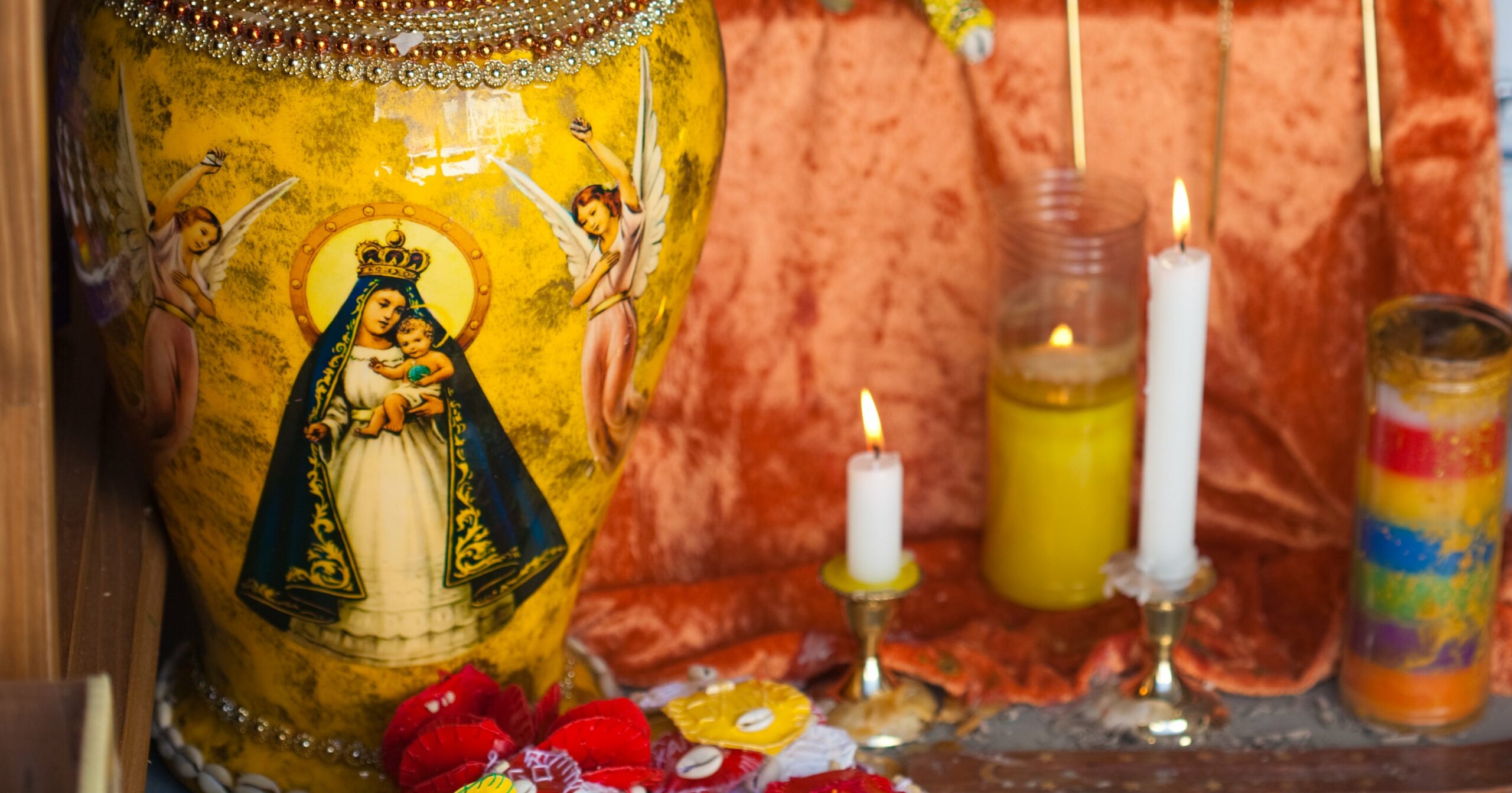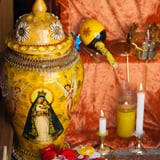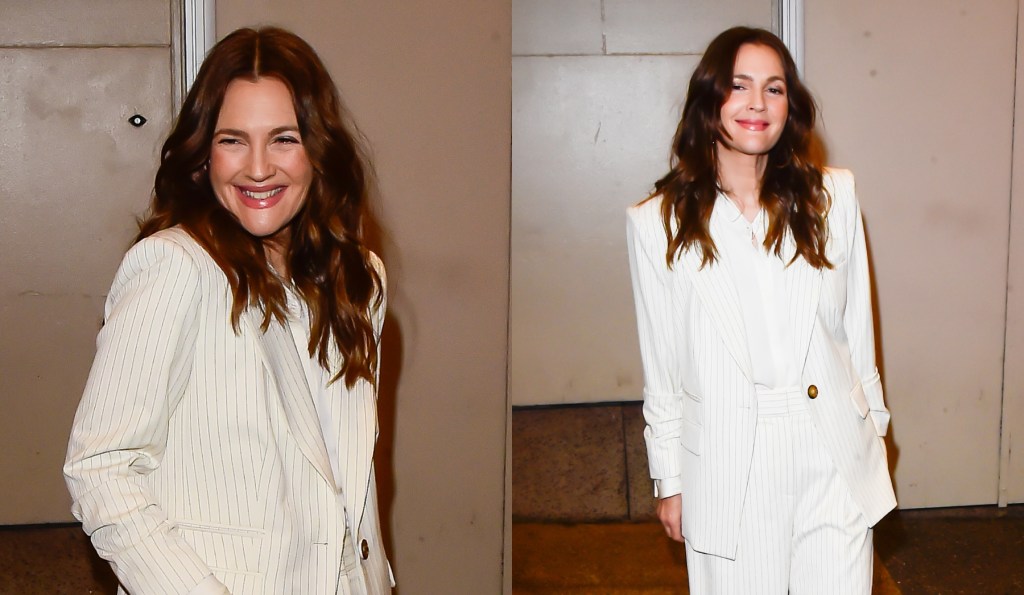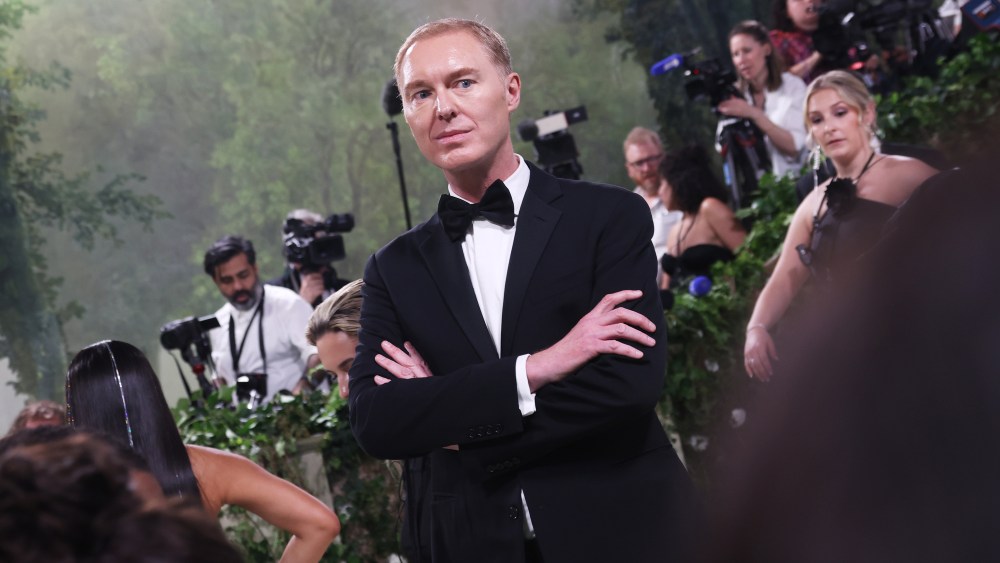Santería might seem like an obscure occult practice akin to black magic or voodoo to the uninitiated. But for those with Caribbean roots, it’s simply another aspect of the culture of our multifaceted region. And yet, it’s an aspect that I never took too seriously, at least until I hit rock bottom. It was then that I realized reestablishing my own power meant reclaiming Santería and other aspects of Puerto Rican culture I had long ignored – and being intentional about how I embodied them.
To be clear, Santería is not black magic or voodoo. It has its roots in the Yoruba religion from Nigeria and was brought to Puerto Rico and the Caribbean during the slave trade. It borrows the gods or Orishas from that religion. However, due to the Catholic influence of Spanish colonizers, these saints were hidden and worshiped under the guise of Catholic saints. For this reason, over many years, many of its practices became common to the culture and were adopted by non-practicing families. Candles are lit to ask for protection or to attract good fortune, and altars are everywhere. In my family growing up, my cousins cracked jokes about sacrificing chickens, and my grandma tried to cure my mother’s asthma by hammering a nail into a tree and letting the sap fall on her head.
But it wasn’t until I was in high school that I became more initiated into the practice and learned about the Orishas. When I was younger, my friends and I would wear colorful bead necklaces called Elekes as an homage to our AfroLatine heritage. We’d talk about which saints we related most to, and for me it was Chango, the Warrior King, and Yemaya the Ocean Mother, and I wore Elekes that represented them. But what I came to realize as I got older was that to take up an Orisha you liked and call yourself their child but not take up the devotion and discipline required of a santero (religious priest) was at best superficial spirituality. At worst it was appropriation. And so I put my Elekes away. Slowly, I put all things spiritual aside and went further down the path of atheism.
And then, I lost my job. Shortly after, after a period of bouncing in between gigs while writing, my partner of nine years left. Slowly, over a year and half, all the security in my life eroded and I found myself, all at once, incredibly alone. Had I been religious, I would’ve had something – a higher power, a divine will – to turn to at my lowest point. But believing only in nothingness and chaos, I just had myself and the will to try and stay positive.
There was only so much a positive attitude could do. Every setback, every rejection letter, every messy interaction with my ex, left me closer and closer to crashing out. On the outside I was fine. I lost weight and was somehow managing to still keep up with my commitments despite all these setbacks. I’d see friends and family and assure them I was doing okay. Then I’d go back to my apartment, cry, and punch a hole in the wall. And then one day, after months of ups and downs, I decided to light a candle to honor the seven Orishas.
You see, I felt that I was too small, too earthly, too mortal to really turn things around. I needed to channel my energy into something bigger, to open myself up to the divine energy of ancestors. A few years earlier, I’d taken up the practice of cocobalé, a martial art with deep ties to Santería, under the tutelage of Gran Maestro Miguel Quijano. During our practices, he had explained to me that the Orisha Elegua was the guardian of the roads and the opener of doors. He’d taught me a prayer to recite to him while making sticks – part of practicing cocobalé means making the sticks you fight with – to invite success. I’d recite this prayer as I made my own stick, but now I started reciting it daily when lighting my candle. While initially I had been more hesitant to dive into the religious aspects of cocobalé due to my doubts on how to balance my cynical world view with the spiritual, slowly, I started incorporating more aspects of Santería into my routines. If a week was especially rough, I would engage in a baño santero to cleanse myself of accumulated negativity and start the week limpiecito. If I ate eggs for breakfast, I’d wash and save the shells to grind into homemade cascarilla later on.
Engaging with these practices, my ancestors, and the Orishas, my life slowly began to turn around. My mental health became better. My physical health became better. More opportunities presented themselves. But more importantly, I began to reconcile my atheistic view of the world with my newfound spirituality. For me, the Orishas are simply an extension of nature. Oya, the goddess of wind, Oshun, the mother of rivers, Ogun, the god of metal – these are aspects of the universe we interact with every day. We see and feel their force. Everything has energy. Everything around us has a spirit. And while I still don’t believe in some greater will dictating our every step, I do believe in the ability to channel or “ask” that energy to guide us towards positivity.
I want to make it clear that I am not a santero. I am not a babalawo. I haven’t put my Elekes back on. But what I do have is a respect for this ancient religion and the discipline and work it takes to practice it. As with all true things, it requires action on the part of the practitioner. In my case, those actions helped bring me back from the lowest point in my life and gave me a better understanding of my own spirituality. And that is something I’m incredibly grateful for as I continue to walk the path paved by those who came before me.
Miguel Machado is a journalist with expertise in the intersection of Latine identity and culture. He does everything from exclusive interviews with Latin music artists to opinion pieces on issues that are relevant to the community, personal essays tied to his Latinidad, and thought pieces and features relating to Puerto Rico and Puerto Rican culture.




